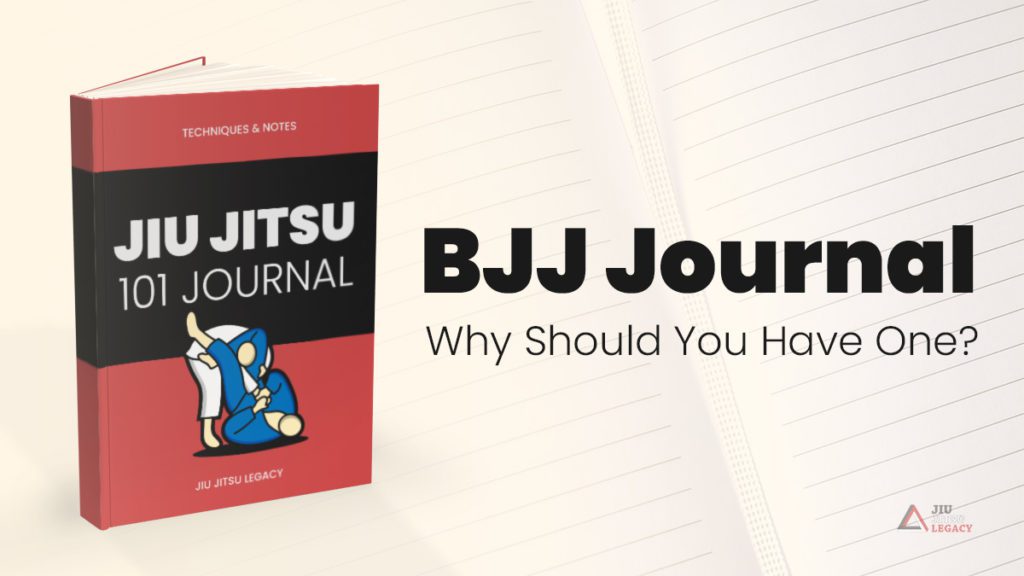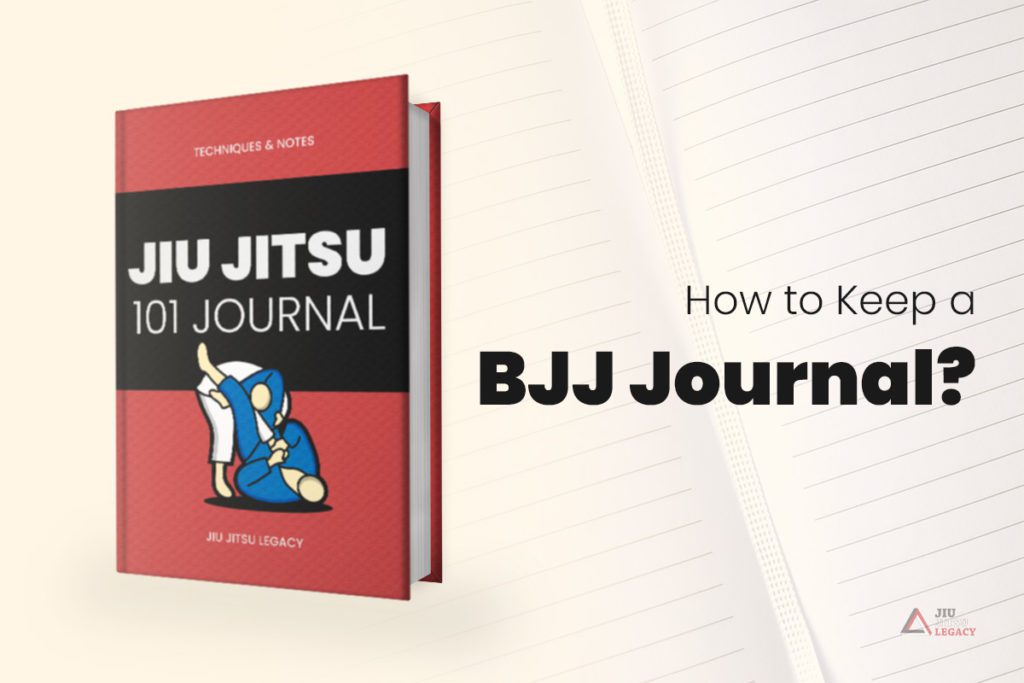Have you ever thought about keeping a BJJ journal? You are most likely taking notes anyway, probably from private classes or seminars. Why not make it more permanent and organized by picking out a method of journaling (pen to paper or electronic) and adding a system to the notes so that they’re easy to follow even when you look at them years later?
Here’s how you can do it.
Why Should You Have A BJJ Journal

For somebody who writes a lot, I’ve never been the person to have a day-to-day journal, or diary, if you will. Jiu Jitsu changed that completely when, at one point, I ended up with so many notes and scribbles all over the place that I couldn’t make sense of it.
Writing things down in class is a great idea. For me, it was a sporadic thing in classes, but when seminars came and black belts (who were pretty much unicorns at the time) would teach, I suddenly wrote so much I could’ve probably gone for a Pulitzer. The only problem was, making sense of it all after months and perhaps even years.
Before I go into some ideas about how you can organize your BJJ journal, let me share a few reasons why I think you need one.
First of all, you will forget. Yeah, I know, at the moment, it seems like you’ll never forget this and that detail or piece of crucial advice someone said at camp. Many camps, rolls, parties, and life chores later, when you try to recall that particular detail or piece of advice, the only thing you’ll find in your mind is the memory that you were supposed to have a memory of something.
This is an extremely frustrating feeling.
The main reason to keep a BJJ journal is to remember things like that. Even if you’ve scribbled down stuff that you can’t relate to, you’ll know who to ask about what because you have it written down.
Another reason to keep a journal is to have a visual representation of things, which often helps people make a lot more sense of things than trying them out with a partner.
You’ll find it easier to make connections if you have a written account of things because you don’t have to imagine them in your mind and try to organize the fleeting images that appear.
Also, writing down, as a process, requires focus and attention and helps impress the subject you’re writing upon your memory much better than just visually or auditory receiving the information.
Top 5 BJJ Journals for Brazilian Jiu-Jitsu Practitioners on Amazon
If you’re looking to start a BJJ journal but don’t know where to start, consider checking out the top 5 options available on Amazon. These journals are designed explicitly for BJJ practitioners and offer a wealth of information to help you improve your skills and take your training to the next level.
- ORGANIZATION & FREEDOM: The perfect balance of organized note taking structure, with enough freedom to make it your own. Take notes on techniques you learned in class or principles you learned while rolling. Level up your note taking, while simultaneously leveling up your belt faster than ever.
- OBJECTIVES & FOCUSES: Create daily objectives and long-term focuses to keep yourself accountable and progress beyond what you merely do in class.
- RETENTION & REFLECTION: The act of writing instructions down allows you to imprint the data into your working memory. By reviewing your notes and reflecting on positive trends your progress will be multiplied.
- DISCOVERY & CATALOG: Answer questions to discover your ‘why’ and document the milestones you have accomplished, the academies you have trained at, the partners you have rolled with, and the competitions you have competed at.
- STUDENT & MASTER: Made for both a new student or a long-standing master. Whether you are just starting your practice or have over 10 years into your journey, the journal holds true, as a timeless piece of documentation, to see how your Jiu Jitsu training has evolved over time.
- Press, Combat Arts (Author)
- English (Publication Language)
- 120 Pages – 08/15/2019 (Publication Date) – Independently published (Publisher)
- Justice, Jacob (Author)
- English (Publication Language)
- 133 Pages – 10/24/2022 (Publication Date) – Independently published (Publisher)
- Jiu-jitsu, Academy of (Author)
- English (Publication Language)
- 151 Pages – 11/11/2020 (Publication Date) – Independently published (Publisher)
- Journals, Training (Author)
- English (Publication Language)
- 156 Pages – 01/29/2018 (Publication Date) – CreateSpace Independent Publishing Platform (Publisher)
What to Write Down in A BJJ Journal
Of course, if you have your own system of taking notes that works, by all means, peruse through this section to get a new idea maybe, or feel free to skip it entirely.
However, if you are trying to write down everything the coach says and then all the things you might have figured out or wondered about after attempting it, you’ll end up with 10-page essays per class, if not per technique. That’s a lot of lost time.
During private lessons, coaches will allow the student to sit down and write stuff and might even offer to help in terms of what notes to take. I do it when I hold privates.
Apart from privates, you can’t expect a coach to wait for people to take notes in a group setting, whether a seminar or a class. And, if you’re writing down like you’re doing your doctoral dissertation, your focus is more on being a typewriter than actually understanding what the coach is demonstrating.
What you write down is important, but the format you write it in is even more important.
Don’t Write Down Technique Directions
You might have already figured this one out, but I’ll still mention it. Forget about taking down technical notes like where the arm goals are, which leg should be at an angle, etc…
Information like that is difficult to recall after a while of not using it/thinking about it.
Moreover, things in Jiu Jitsu change so rapidly that those specific positioning tips might not be used any longer. Forget describing what you’re seeing and looking to figure out the point of whatever subject you’re taking notes about.
Specific Tasks and Goals
A good use of a BJJ journal is tracking your progress in an area you’re looking to specialize in. let’s say, for the sake of argument, that you want to become a leg locks specialist.
That would mean picking a certain type of leg lock (ankle lock, heel hook, kneebar…) and trying to execute a number of them, like, 1.000, for example, for a given period (let’s say three months).
Every time you are successful in catching someone with a leg lock, you’ll note it down in your journal, keeping track. After 1.000 taps in rolling and competition, you’ll be a pretty solid leg locker, but you’ll only be able to keep track if you’re writing your progress down meticulously.
The same applies to passing, sweeping, pinning, and takedowns…. You name it.
Gameplan Development
A BJJ journal is great for helping you visualize a BJJ game plan. Just like you can track your specialization progress, you can write notes on connecting your attacks and defense, transitioning between positions, and what you’d like to achieve from each position.
Drawing is a better method than descriptive writing here, with a flow chart being one of the best ways to visualize your game. Expect this chart to change as you learn, so expect to add and take things away over time.
It is nice to be able to check back and see your old game visually represented in a BJJ journal.
Clicks
These are the things you’re looking for in training. In a few training sessions, you’ll not learn the technique of the day (or month). However, if you write down the concepts, the reasons the move works, and your thoughts on integrating it, you’ll speed up your “click”
A click is when several different things you’ve been doing repeatedly suddenly become clear to you in terms of how they work and interact between themselves.
You’ll have more frequent clicks when you’re using a BJJ journal to keep track of them.
Questions
Possibly the most important use of your BJJ journal is to write down questions. For example, when in class, allow the instructor to demonstrate everything, noting down the subject and perhaps the underlying concept.
Then, after you’ve tried and tested specific sparring and rolling in training, go back to the notes and add any questions and problems you’ve encountered when experimenting with the move/s.
A cool hint for faster progress and clicks is to try and answer these questions yourself, and then go to your coach with both the question and answer.
Drills
A BJJ journal can also work as a logbook for drills, where you track your repetitions, time you’ve spent drilling something, questions, and perhaps any clicks you get from drills
Competition Experiences
This is a very underestimated use of a BJJ journal. While you remember vividly many competition moments, particularly how you felt during those moments, the lessons learned from them would be much more helpful if you wrote exactly how you felt as soon as possible after the matches.
You can later easily recall the feeling and the way you were thinking, which, in connection with analyzing the video of your matches, will give you better insight into your performance.
How to Keep a BJJ Journal

Personally, I like the pen-to-paper approach. A dedicated notebook works best for me because I can not just write things down but try to connect them with arrows and stuff to better represent the subject I am writing about.
However, you can also take notes electronically on a tablet or our phone. There are even dedicated apps for that, and not just in terms of journaling, but an actual specific BJJ journal.
How you take notes also means how you try and connect things Some people write, others draw, and many like to color code… Use whichever method you find allows you to recall the information best when you look at it at a glance.
In Summary
A BJJ journal will help you improve at Jiu Jitsu by helping you understand what is going on in classes and your own game. It will help you make sense of your impressions, the information you’re getting, and any questions you might have, plus is a great way to track progress and create motivation for you to work even harder. All you need to do is try it for a few weeks.

Ogi is a black belt that does Jiu Jitsu full time and is very passionate about anything grappling-related.
He is also the head coach of Enso Jiu Jitsu in Macedonia and an aspiring Globetrotter.





